Prezident jmenoval Jiřího Drahoše předsedou AV ČR

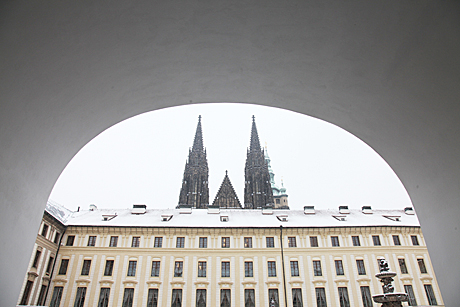


Foto: Stanislava Kyselová, Akademický bulletin
Prezident republiky Václav Klaus jmenoval 13. února 2013 na Pražském hradě prof. Jiřího Drahoše předsedou Akademie věd ČR. Pro funkční období 2013–2017 jej do čela AV ČR navrhl Akademický sněm na XLI. zasedání v prosinci loňského roku. „Akademie věd se těší mé pozornosti, protože jsem z ní vyšel a v dobrém na ni vzpomínám. Zajímá mě, co se v ní děje, a jsem rád, že nevím o žádných velkých problémech. Považuji to za správné, protože akademici se mají zabývat akademickou činností, nikoli aktivitami jiného typu. Přeji vám, aby se vám dařilo a aby Akademie byla důstojnou institucí,“ uvedl při inauguraci Václav Klaus.
Jiří Drahoš vede Akademii věd od roku 2009, kdy ve volbě zvítězil nad prof. Evou Sykovou, ředitelkou Ústavu experimentální medicíny AV ČR. Jeho nynější předsednický mandát vyprší 24. března 2013. I ve druhém funkčním období chce Jiří Drahoš především usilovat o stabilizaci AV ČR v systému VaVaI, zvyšovat kvalitu vědeckého výzkumu a posílit spolupráci s vysokými školami a podnikatelskou a aplikační sférou. Prioritu pro tento rok představuje Strategie rozvoje AV ČR pro období 2014–2020, jejímž cílem je zvýšit vědecký výkon Akademie a jejích pracovišť vytvořením konzistentního programu, který by zohledňoval aktuální trendy světové vědy a vývoje poznání a zároveň reagoval na společenské výzvy v oblasti vědy a výzkumu. „Často zdůrazňuji, že AV ČR je nejvýkonnější institucí v českém výzkumném prostředí. Jde však o to, aby se Akademie věd a její pracoviště staly respektovanými evropskými vědeckými centry s vysokou úrovní dosahovaných výsledků. Teprve taková pozice zaručuje prestiž a je předpokladem pro získání potřebných finančních zdrojů. Pro dosažení vytčených cílů je ovšem nezbytné vytvořit odpovídající podmínky, a to jak vnější, tak také vnitřní,“ konstatuje Jiří Drahoš v programovém prohlášení.
lsd
News
4 Jul 2013 To ESOF 2014 by bus
Euroscience and the ESOF local organizers that provide young researchers with a unique opportunity to interact with leading scientists from various scientific fields wish to encourage and promote the participation of groups of graduate and PhD candidates. The groups will reach Copenhagen in Denmark (the next host of ESOF in 2014) by bus (ideally a low emission vehicle) or some other low cost transportation. Selected participants will have access to all ESOF 2014 programmes and to the specific sessions dedicated to Young Researchers. This project is based on the successful Barcelona and Torino Science Bus event, realized by the ESOF2008 and ESOF2010 Team that brought to Barcelona 40 and to Torino 30 students. The Science busses participants will be offered a very low conference fee (80€), the possibility to be hosted in low cost accommodations in Copenhagen and onsite help provided by the local organisers.
4 Jul 2013 International Workshop in Ceske Budejovice
Researchers, students, and interested public are invited to a 1-day workshop Plant-insect food webs along latitudinal and altitudinal gradients originating from lowland tropical rainforests bringing to Ceske Budejovice some of the leading scientists in ecology. The workshop will include oral presentation by 18 senior on biodiversity along ecological gradients, followed by an open poster session where you can present your own poster, and a general discussion with refreshments.
3 Jul 2013 Names for New Pluto Moons
 The International Astronomical Union (IAU) is announcing that the names Kerberos and Styx have officially been recognised for the fourth and fifth moons of Pluto, which were discovered in 2011 and 2012. The names were submitted to the IAU by the leader of the team responsible for the discovery, who had called for the help of the general public in an open contest that attracted a substantial number of participants. More information on http://www.iau.org/public_press/news/detail/iau1303/.
The International Astronomical Union (IAU) is announcing that the names Kerberos and Styx have officially been recognised for the fourth and fifth moons of Pluto, which were discovered in 2011 and 2012. The names were submitted to the IAU by the leader of the team responsible for the discovery, who had called for the help of the general public in an open contest that attracted a substantial number of participants. More information on http://www.iau.org/public_press/news/detail/iau1303/.
 The Network of atmospheric stations within the European Research Infrastructure ICOS has welcomed a new member. An atmospheric station in Křešín by Pacov in the Bohemian – Moravian Highlands was launched June 17, 2013 on the occasion of observing the 25th anniversary of the global environmental observatory in Košetice. The stations have been consolidated and it is a major research and monitoring infrastructure in the Czech Republic and Central Europe. It consists of two components – the observatory at Košetice, operated since 1988 by the Czech Hydrometeorological Institute and the atmospheric station Křešín by Pacov, which began operations in June of this year. The atmospheric station was built and is administered by CzechGlobe, the Global Change Research Centre of the ASCR, and is situated 100 meters from the observatory.
The Network of atmospheric stations within the European Research Infrastructure ICOS has welcomed a new member. An atmospheric station in Křešín by Pacov in the Bohemian – Moravian Highlands was launched June 17, 2013 on the occasion of observing the 25th anniversary of the global environmental observatory in Košetice. The stations have been consolidated and it is a major research and monitoring infrastructure in the Czech Republic and Central Europe. It consists of two components – the observatory at Košetice, operated since 1988 by the Czech Hydrometeorological Institute and the atmospheric station Křešín by Pacov, which began operations in June of this year. The atmospheric station was built and is administered by CzechGlobe, the Global Change Research Centre of the ASCR, and is situated 100 meters from the observatory.
 Russian science journalists inform at various web portals about the new law that is about to radically transform the almost 300-years old RAS. The mentioned law should be adopted without a previous discussion with the scientific community in fast-track debate in Russia's parliament. This news comes only a month after the new reform-minded physicist Vladimír Fortov was elected RAS president. According to the Russian Prime Minister Dmitry Medvedev who was speaking to the RIA Novosti news agency the new law and its outcome will enable scientists “to concentrate on research and will spare them the irrelevant function of managing”.
Russian science journalists inform at various web portals about the new law that is about to radically transform the almost 300-years old RAS. The mentioned law should be adopted without a previous discussion with the scientific community in fast-track debate in Russia's parliament. This news comes only a month after the new reform-minded physicist Vladimír Fortov was elected RAS president. According to the Russian Prime Minister Dmitry Medvedev who was speaking to the RIA Novosti news agency the new law and its outcome will enable scientists “to concentrate on research and will spare them the irrelevant function of managing”.
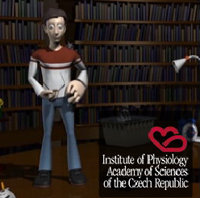 Three documentary videos produced in the Czech Republic were selected out of 80 participants as the final candidates for the top award at the European science TV and new media festival held in Dublin. One of them was interactive presentation of the Institute of Physiology AS CR, v. v. i., made by OAT Studios & The Czech Academy of Sciences, Czech Republic. The presentation has 12 chapters, with each one representing a topic or problem that scientists of the institute deal with. Each chapter has three parts. The first is a short cartoon intro, featuring a young scientist and his pet rat, which introduce the theme. The second part is a video about a concrete experiment or specific job at the labs. The last part of every chapter is scientific text with more details about the topic. There are also contacts for a specific scientist or laboratoires. The other two projects from the Czech Republic were CSI Death on the Czech Sea Shore produced at the Charles University in Prague and Harnessed River made by Fontis TV produktion.
Three documentary videos produced in the Czech Republic were selected out of 80 participants as the final candidates for the top award at the European science TV and new media festival held in Dublin. One of them was interactive presentation of the Institute of Physiology AS CR, v. v. i., made by OAT Studios & The Czech Academy of Sciences, Czech Republic. The presentation has 12 chapters, with each one representing a topic or problem that scientists of the institute deal with. Each chapter has three parts. The first is a short cartoon intro, featuring a young scientist and his pet rat, which introduce the theme. The second part is a video about a concrete experiment or specific job at the labs. The last part of every chapter is scientific text with more details about the topic. There are also contacts for a specific scientist or laboratoires. The other two projects from the Czech Republic were CSI Death on the Czech Sea Shore produced at the Charles University in Prague and Harnessed River made by Fontis TV produktion.
The prizes will be awarded on the 22nd November 2013 at Ciencia Viva Lisbon in Portugal.
At the Annual Meeting of The American Society for Cell Biology (ASCB) in San Francisco on 16 December 2012, a group of editors and publishers of scientific journals elaborated a collection of eighteen recommendations which should increase the quality of research assessment. Inter alia, they point out the fact that the Journal Impact Factor, which serves today as the primary parameter for the comparison of scientific outputs, was originally created as a tool to help librarians identify journals to purchase, not as a measure of the scientific quality of research in an article. The group agreed that the Journal Impact Factor, which has literally become an ‘obsession’ in global science, in fact deforms the assessment of scientific results. At the stimulus of its Scientific Council, the Academy of Sciences of the CR has joined the San Francisco Declaration of Research Assessment as one of the 78 original signatory scientific and research institutions and international scientific societies. You can find its full text here.
10 Jun 2013 Plant Biotechnology: Green for Good II
 The Centre of the Region Haná cordially invites to attend the international conference Olomouc Biotech 2013: Plant Biotechnology: Green for Good II. From June 17 to 21, 2013, the conference will promote collaboration in the frontier areas of plant biotechnology research, development and innovations. During the conference, scientists from academic institutions and companies will have the opportunity to meet with students. A workshop strengthening the cooperation of the industry and academia will be organized. Conference language will be English. The conference is held under the auspices of the European Federation of Biotechnology and Biotechnical Society of the Czech Republic.
The Centre of the Region Haná cordially invites to attend the international conference Olomouc Biotech 2013: Plant Biotechnology: Green for Good II. From June 17 to 21, 2013, the conference will promote collaboration in the frontier areas of plant biotechnology research, development and innovations. During the conference, scientists from academic institutions and companies will have the opportunity to meet with students. A workshop strengthening the cooperation of the industry and academia will be organized. Conference language will be English. The conference is held under the auspices of the European Federation of Biotechnology and Biotechnical Society of the Czech Republic.
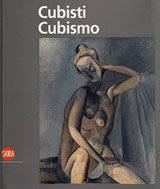
 The Inauguration of Application Laboratories of Microtechnologies and Nanotechnologies (ALISI) was held May 30, 2013 in the Institute of Scientific Instruments in Brno. The aim of ALISI was to build a new research center with modern equipment achieving applicable R&D results and approaching the top world institutions. According to the Director of ALISI Professor Pavel Zemanek, the research activities are related to diagnostics and technologies using the methods of magnetic resonance, laser microtechnologies and nanotechnologies – especially interferometry and spectroscopy, measurement and processing of signals in medicine, electron microscopy and lithography, electron and laser beam welding, thin film deposition by magnetron sputtering, cryogenics, and construction of unique scientific instruments and systems. The existence of ALISI is supposed to be an impulse towards broadening cooperation with Czech as well as abroad industrial partners, universities, medical facilities and R&D institutes.
The Inauguration of Application Laboratories of Microtechnologies and Nanotechnologies (ALISI) was held May 30, 2013 in the Institute of Scientific Instruments in Brno. The aim of ALISI was to build a new research center with modern equipment achieving applicable R&D results and approaching the top world institutions. According to the Director of ALISI Professor Pavel Zemanek, the research activities are related to diagnostics and technologies using the methods of magnetic resonance, laser microtechnologies and nanotechnologies – especially interferometry and spectroscopy, measurement and processing of signals in medicine, electron microscopy and lithography, electron and laser beam welding, thin film deposition by magnetron sputtering, cryogenics, and construction of unique scientific instruments and systems. The existence of ALISI is supposed to be an impulse towards broadening cooperation with Czech as well as abroad industrial partners, universities, medical facilities and R&D institutes.
This year we commemorate the 1150th anniversary of the arrival of Saints Cyril and Methodius to Great Moravia. Various projects have been prepared for this international event. On the national level is a historically oriented exhibition project titled, Cyril and Methodius – their time, life and work. This presents the cultural and social phenomenon of the Cyrillo-Methodian mission stressing its crucial importance for the establishment of the Czech national community. The exhibition presents historical and archaeological items collected during research lasting more than 50 years by the Moravian Museum and partner organizations and connected to the history of Great Moravia before, during and after the apostles’ mission. (The saints’ day is observed in the Czech Republic and Slovakia July 5.)
29 May 2013 The long journey to the Higgs boson and beyond at the LHC
Institute of Physics of the AS CR invites you to the 5th Dvořák Lecture by Professor Peter Jenni from the University of Freiburg, Germany and CERN, Geneva, Switzerland on June 12, 2013 at 3:00 pm in the Lecture Hall of the Institute of Physics, Na Slovance 2, Prague 8. Since three years the experiments at the Large Hadron Collider (LHC), in particular ATLAS, investigate particle physics at the highest collision energies ever achieved in a laboratory. Following a rich harvest of results for Standard Model (SM) Physics came in 2012 the first spectacular discovery of a new, heavy particle, most likely the long-awaited Higgs boson. The latest results with the full data set accumulated over the first three-years running period of the LHC will be presented.
27 May 2013 L’Oréal For women in science
 Remarkable Czech women scientists have received the L’Oréal Award. The ceremonial act took place at the beautiful auditorium of National technical library in Prague May 23, 2013. Three laureates were chosen by special committee in front with Professor Blanka Říhová. First laureate of this year For Women in Science is Ing. Lubomíra Balková from Department of Mathematics Faculty of Nuclear Sciences and Physical Engineering Czech Technical University. As second the committee has chosen PharmDr. Martina Čečková from Department of Pharmacology and Toxicology, Faculty of Pharmacy, Hradec Králové and the third laureate is MUDr. Eva Froňková from the 2nd Faculty of Medicine of Charles University in Prague.
Remarkable Czech women scientists have received the L’Oréal Award. The ceremonial act took place at the beautiful auditorium of National technical library in Prague May 23, 2013. Three laureates were chosen by special committee in front with Professor Blanka Říhová. First laureate of this year For Women in Science is Ing. Lubomíra Balková from Department of Mathematics Faculty of Nuclear Sciences and Physical Engineering Czech Technical University. As second the committee has chosen PharmDr. Martina Čečková from Department of Pharmacology and Toxicology, Faculty of Pharmacy, Hradec Králové and the third laureate is MUDr. Eva Froňková from the 2nd Faculty of Medicine of Charles University in Prague.
Americans will deliver one of the four unique lasers to the sophisticated scientific centre ELI Beamlines, now being built in Dolní Břežany near Prague, ELI Beamlines management said at a press conference that took place on May 24, 2013 in the main building of ASCR. The ELI Beamlines scientific team started working on its development along with one of the best known laser laboratories in the world, Lawrence Livermore National Laboratory in California.
10 May 2013 The gas explosion on Monday in Prague has severely affected the building of the Academy
 The neo-Renaissance historical building of the Academy of Sciences of the CR was severely damaged on the morning of 29 April 2013 in connection with the gas explosion, which occurred in Divadelní Street on the ground floor of the building across from the side section of the Academy. A massive pressure wave shattered the window panes and damaged the interiors of not only the whole length of the building from the side of Divadelní Street but also broke the glass of the windows towards Krocínova Street, towards the courtyard and some towards Národní třída (National Avenue). The explosion inflicted the greatest damage, the amount of which is estimated at CZK 10 million, in the Library and Head Office of the ASCR.
The neo-Renaissance historical building of the Academy of Sciences of the CR was severely damaged on the morning of 29 April 2013 in connection with the gas explosion, which occurred in Divadelní Street on the ground floor of the building across from the side section of the Academy. A massive pressure wave shattered the window panes and damaged the interiors of not only the whole length of the building from the side of Divadelní Street but also broke the glass of the windows towards Krocínova Street, towards the courtyard and some towards Národní třída (National Avenue). The explosion inflicted the greatest damage, the amount of which is estimated at CZK 10 million, in the Library and Head Office of the ASCR.
Institute of Physics ASCR invites you to a seminar Intermediate valence in Pu and Pu-based superconductors by Alexander Shick (Institute of Physics ASCR) on May 15th, 2013 at 15:00 in the Lecture Hall of the Institute of Physics, Cukrovarnická 10, Prague 6. Actinide materials are the backbone of nuclear energy. In order to realize the full potential of nuclear power, and to avoid the risks for society and environment, there is a need in solid understanding of the physical and chemical properties of actinide materials.
2 May 2013 Czech microwave technology faiths flood demage at University in Buenos Aires
Prague’s program for the European Union of Science Journalists’ Associations (EUSJA) Study Trip in March for about 30 representatives from abroad met with favourable response. It was organised by the Academic Bulletin, an official magazine of Academy of the Sciences of the Czech Republic (ASCR).The very first result of the Study Trip at Lysolaje Campus came from the Swedish journalist, Kaianders Sempler, who published an article in the journal NyTeknik based on the address of Milan Hájek of the Institute of Chemical Process Fundamentals of ASCR. Professor Hájek spoke on the use of microwave technology to dry books damaged by the 2002 devastating floods in Prague.
This article with illustration came to the attention of the San Martín National University in Buenos Aires that suffered flash floods in early April. Its president Carlos Ruta asked for the assistance and cooperation of the Institute of Chemical Process Fundamentals regarding the drastic consequences of the flooding which affected the University library and its many books. According to University representatives, the methods that exist in Argentina are still very craft-centered and traditional and so they sought expert help from abroad. Professor Hájek of the Institute of Chemical Process Fundamentals confirmed the Institute is assisting in salvaging and restoring thousands of books of the Argentine university.
Prof. Eric Maskin, 2007 Nobel Laureate, will give a public lecture on “How to Make the Right Decisions without Knowing People's Preferences: An Introduction to Mechanism Design” at CERGE-EI in Prague. The lecture will take place on April 29 at 16:30 CEST. For online streaming, go to http://www.cerge-ei.cz/seminars/eric-maskin-live-at-cerge-ei.
22 Apr 2013 Increase in typhoon intensity in eastern Asia in last 130 years
 Typhoons or hurricanes affect large areas of the World, which are often densely populated (eastern cost of USA or eastern Asia). New evidence about dramatic increase in occurrence of strong typhoons since the end of 19th century exists just for eastern Asia. These new findings brought study published in Global Change Biology. The changing trend of extremely strong typhoons from 1880 was confirmed by the mean of analysis more than 30,000 tree-rings and climatic data about typhoon frequency and intensity. “Meteorological measurements of typhoon occurrence and intensity are usually limited for short period in Eastern Asia. Such kind of information does not allow reconstruction of longterm changes. However, combination of climatic records with tree-ring data allowed us to find relationship between typhoons and tree-growth and reconstruct the typhoon intensity much more farer to the history,” says first author of study Jan Altman of Botanical institute, The Academy of Sciences of the CR.
Typhoons or hurricanes affect large areas of the World, which are often densely populated (eastern cost of USA or eastern Asia). New evidence about dramatic increase in occurrence of strong typhoons since the end of 19th century exists just for eastern Asia. These new findings brought study published in Global Change Biology. The changing trend of extremely strong typhoons from 1880 was confirmed by the mean of analysis more than 30,000 tree-rings and climatic data about typhoon frequency and intensity. “Meteorological measurements of typhoon occurrence and intensity are usually limited for short period in Eastern Asia. Such kind of information does not allow reconstruction of longterm changes. However, combination of climatic records with tree-ring data allowed us to find relationship between typhoons and tree-growth and reconstruct the typhoon intensity much more farer to the history,” says first author of study Jan Altman of Botanical institute, The Academy of Sciences of the CR.
Association Euroscience asks for help to stimulate the debate around research in Europe. Austerity has taken its toll and disturbed research cycles across Europe. Particularly affected are scientists from Southern Europe. Find out first-hand how scientists confronted to austerity deal with it in Greece, Spain, Italy and Portugal, in a new Special Issue of the Euroscientist, the journal of Euroscience. This issue analyses the situation of how many of scientists were forced to emigrate, and there are also the stories of those who decided to stay. You will hear from researchers sharing their experience of navigating the troubled waters of recession, when it comes to maintaining a seemingly steady research career path.



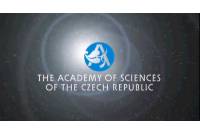



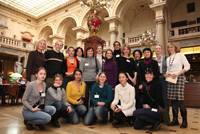


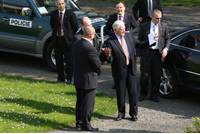



 Česky
Česky
